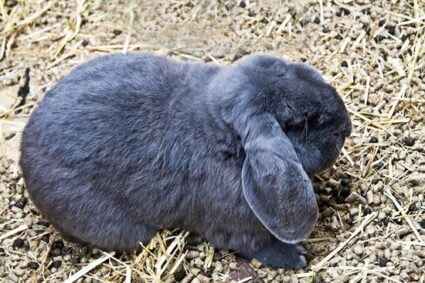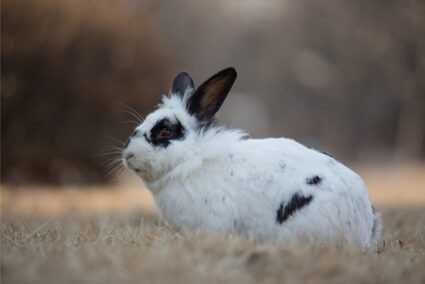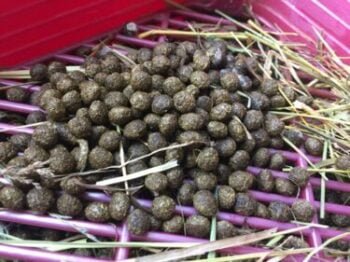According to the popular saying; ‘rabbits poop every time they hop.’ While this is a slight exaggeration, rabbits do poop more often than most other household pets.
Rabbits produce more than a hundred poop pellets per day due to their high-fiber diet. Rabbits urinate between 2 and 8 times per day. How often depends on the rabbit’s age, neuter status, and health.
Abnormal pee or poop is a sign of illness. For example, runny stools and urine trickles are signs of infection. So, check your rabbit’s pee and poop daily for signs of health problems.
Normal Amounts of Pee and Poop in Rabbits
Rabbits differ, but most rabbits will:
- Urinate 2 – 8 Times Per Day – The volume of pee can vary. And unneutered male rabbits may spray more than 8 times a day.
- Eliminate 125 – 200+ Fecal Pellets (Droppings) Per Day – These are round, dry, and odorless.
- Eliminate a Small Number of Cecals (Soft Stools) – You’ll rarely see these because your rabbit eats them.
Don’t be too concerned if your rabbit is different. However, the critical thing to remember is that no rabbit should go 24 hours without peeing and/or pooping. If your rabbit has not eliminated for 24 hours, this is a medical emergency.
Different Types of Rabbit Poop
Unlike most other animals, rabbits produce two types of poop; droppings and Cecals. Y you should see 125+ droppings per day. You won’t see Cecals very often (if ever) because your rabbit will eat them. So, what do the different types of rabbit poo look like?
Droppings
The scientific name for rabbit droppings is fecal pellets. Droppings are small spherical shapes (about 0.75cm across). They are quite dry in texture and may crumble if you squash them. Healthy droppings should have bits of undigested hay in them, and they should not smell.
The normal rabbit poop color is medium brown or gray. According to Rabbit Welfare, dark or very small rabbit droppings may be a sign of illness. The only exception is if your rabbit eats lots of fresh grass. In which case, dark brown droppings are expected.
Cecals (or Caecotrophs)
Cecals are produced in the cecum – a pouch which is positioned between the large and small intestine. The cecum is filled with bacteria and yeast, which help to break down otherwise indigestible fiber. Food that enters the cecum is transformed into Cecals.
Cecals are a lot wetter than droppings, and they smell bad. They look like small, brown grapes. Thankfully, you won’t see too many of these because your rabbit will eat them.
According to MSPCA, Rabbits eat Cecals because they provide:
- Short-chain fatty acids
- Microbial proteins
- Nitrogen
- B Vitamins
Your rabbit needs these to be healthy. If you are seeing Cecals in your rabbit’s cage or stuck to your rabbit’s bottom, see a vet.
There is a third type of rabbit poop, which is very concerning. This is loose stools (or diarrhea). Diarrhea is life-threatening, so it requires immediate treatment.

Diarrhea in Baby Rabbits
A baby rabbit with diarrhea will probably die within a couple of hours unless you seek treatment. Diarrhea is more prevalent in baby rabbits than adult rabbits. This is because:
- Sometimes, babies are taken from their mothers too early (i.e. before eight weeks). This means they don’t get enough antibodies from their mothers, leaving them vulnerable to infections. And these infections cause diarrhea.
- Because baby rabbits are so cute, we can’t help but cuddle and kiss them. The problem is that humans are covered in Escherichia coli bacteria which can be fatal to baby rabbits. So, when handling baby rabbits, we should make sure our hands are disinfected. We should also resist the urge to kiss baby rabbits (at least until they are older).
- The other infection that can cause diarrhea in baby rabbits is coccidia, which is a parasitic infection. Many antibiotics can treat this condition as long as it is caught early.
To prevent these issues, do not buy a baby bunny that is younger than 8 weeks old. Also, if you see this practice happening, inform the seller that it is dangerous. When handling a baby rabbit, make sure your hands are clean and disinfected.
Runny Stools in Adult Rabbits
True diarrhea is very rare in adult rabbits. However, adult rabbits do sometimes develop loose stools. The following factors can cause loose stools:
- Starchy Food – Foods such as crisps, bread, and biscuits contain too much digestible carbohydrate. This means they move straight through the rabbit’s gastrointestinal (GI) tract, creating runny poos. Some poor-quality rabbit mueslis can even cause runny poos.
- No Hay to Chew on – Rabbits need to constantly chew on hay to keep their GI tract healthy. If they cannot chew on hay, their gut muscles will become sluggish. This can impact the delicate balance of bacteria and yeast in the rabbit’s cecum. Once these bacteria are thrown out of balance, this can lead to something called Cecal dysbiosis. This essentially means that the rabbit produces runny stools rather than firm Cecals.
- Urinary Tract Disorders – Again, this can slow down movement in the intestines. This disrupts the balance of bacteria/yeast in the rabbit’s cecum. And this makes it difficult to produce Cecals.
- Other Health Conditions – Head tilt and dental pain can also cause the intestines to slow down, so this may lead to runny stools.
- Arthritis or Obesity – If a bunny finds it hard to move around, they will not be able to eat the Cecals, so they’ll end up sitting on them. Squashed Cecals can look like runny stools. Although they are not as serious as true runny stools, they are worrying because the rabbit will miss out on the nutrition they need. Also, they may become vulnerable to flystrike if you don’t clean their bottom.
Rabbit Pooping More than Normal
If you have recently changed your rabbit’s diet (even in a small way), this could increase the volume of poop. There’s not really such thing as “too much” poop. But there is such a thing as the wrong kind of poop. To reiterate, the following are cause for concern:
- Runny or watery poo
- Poo that is stuck to the rabbit’s bottom
- Visible Cecals (the soft, grape-like stools) – Rabbits should eat these so they should not be visible
- Very small droppings
- Black or red droppings (dark brown droppings are normal if your rabbit eats fresh grass)
If you notice any of the above, this suggests something is wrong. Improving your rabbit’s diet may help in the long run but seek medical attention in the first instance.
Best Diet for Healthy Rabbit Poos
Feeding your rabbit an appropriate diet is essential for good digestive health. A species-appropriate diet is:
- Unlimited grass hay (Timothy hay is ideal)
- 1-2 cups of green veggies per day
- Unlimited water
- 1-2 egg cups of high-fiber pellets per day (optional)
Hay is vital because the constant act of chewing helps to mobilize the gut muscles. This pushes food through the rabbits gastrointestinal (GI) tract, ensuring healthy poos and Cecals. As mentioned, mobilizing the gut muscles helps to ensure the cecum is healthy, which prevents Cecal dysbiosis.
Processed food should be avoided because it causes digestive problems. Fruit (such as apple flesh) is acceptable in very small amounts, but this should only be given as an occasional treat. An ideal treat for rabbits is Brussel sprouts. If you intend to change your rabbit’s diet, you must do so slowly.

How Often Should Rabbits Urinate?
As mentioned, most rabbits urinate between 2 and 8 times per day. This will vary depending on how much the rabbit drinks and whether they are neutered.
When rabbits are very ill or stressed, they may stop urinating. So, check if your rabbit has urinated each day.
The easiest way to monitor your rabbit’s urine is to line the litter box with newspaper and place hay on top. It is easy to inspect urine stains on newspaper so you can see if anything is amiss.
Problems to Look for in Rabbit Urine
The following scenarios would be cause for concern:
- Your rabbit has produced much less (or much more) urine than normal, but with the same water intake. It’s normal for rabbits to produce more urine in hot weather because they drink more water.
- Your bunny is straining to pass urine; crying or whimpering.
- A tiny urine patch (or trickle) can indicate a urinary tract infection.
- Sludgy urine is concerning. White or cloudy urine is normal because rabbit urine contains a lot of calcium. But if you can see sludgy or grainy calcium deposits; this is a cause for concern.
- Blood flecks in the urine. This shouldn’t be confused with completely red urine, as this can be caused by eating beetroot.
It’s easier to see urine stains on newspaper or light-colored paper pellets. Darker-colored bedding is less practical for this purpose.
What Color Should Rabbit Pee Be?
The color of rabbits urine can be white, yellow, orange, brown, purple, or even red. As mentioned, beetroot can turn the wee red, and red cabbage can turn the pee purple. But if the urine is light in color and flecked with patches of red, this could be blood.
If your rabbit’s urine is orange or brown, encourage them to drink a little more water. Cloudy urine is normal, but sludgy urine is not. If you see sludge in your rabbit’s litter pan, seek medical advice immediately.
Urinary Tract Diseases in Rabbits
Unfortunately, urinary tract diseases (UTD) are quite common in rabbits. Often, the first sign of a UTD is in the rabbit’s urine. As rabbit owners, it’s helpful to be aware of these so we can look after our rabbit’s urinary health. Here are the most common UTD’s in rabbits:
- Bacterial Cystitis – This is an infection of the bladder. Escherichia coli or Pseudomonas spp can cause it. A rabbit with bacterial cystitis may strain to wee, only produce small trickles of wee and/or have very smelly wee.
- Sludgy Urine – Sludgy urine is caused by a build-up of calcium in the rabbit’s urinary tract. It was once believed that a high calcium diet caused sludgy urine, but we now know this is not the case.
- Kidney Stones – Sludgy urine can eventually develop into kidney stones. These can be extremely painful and can stop the rabbit from weeing.
- Kidney Disease – Infections, trauma, and diabetes can cause kidney disease. It causes straining and painful urination.
Most UTD’s can be treated. But, once again, early detection is vital. Also, it’s best to try and prevent these diseases in the first place.
How to Promote Good Urinary Health
Here are some tips for promoting optimum urinary health:
- Hydrate – This cannot be emphasized enough. Dehydration can lead to urinary tract inflammation and infection.
- Cleanliness – Clean and disinfect your rabbit’s cage, water bowl, and litter pan regularly. The water bowl and litter pan should be cleaned daily. This will minimize bacteria inside the cage. Also, rabbits are more likely to fully empty their bladder if their toilet is kept clean.
- Regular Exercise – Enough exercise can help to protect against UTIs.
- Treat any Pain Conditions – If your rabbit has arthritis, muscle relaxants can improve mobility. This means your rabbit will stay clean and healthy.
- Reduce Stress – This will encourage your rabbit to fully empty their bladder when peeing.
- Feed Unlimited Grass Hay – Timothy, Oat or Orchard.
Do not cut calcium out of your rabbit’s diet to prevent sludgy urine. In years gone by, this was the recommended advice. But we have since discovered that sludgy urine is not caused by a high calcium diet; it is a metabolic concern. If you do cut calcium out of your rabbit’s diet, the rabbit may start leeching calcium from its bones, so it’s not a good idea.
Instead, follow the tips mentioned above. And at the first signs of sludgy urine, take your rabbit to the vet.
Healthy Elimination in Rabbits
Rabbits pee and poop at different rates, so it’s difficult to say exactly how often a rabbit will eliminate. Here are some golden rules to remember:
- If your rabbit doesn’t pee and/or poo for 24 hours, this is a medical emergency.
- It’s normal for rabbit pee to be colorful. But sludgy and blood-flecked urine is not normal.
- Rabbits poop 125+ droppings per day. These should be circular, brown/gray, and reasonably hard.
- All rabbits produce Cecals. These are smelly, but you should not usually see them because the rabbit eats them. If you see uneaten Cecals, you should take your rabbit to the vet.
- Runny poo or diarrhea is never normal. It should be treated urgently.
Remember, rabbit prefer to do their business in a sanitary environment. So, if you want to keep your bunny happy, clean the litter pan daily.


Hi Lou:
Thanks for your advice and tips – they are very useful.
I do have a question for you. I have two bunnies who were well trained for using the litter box. Until the dove got pregnant and gave birth to 5 very cute baby bunnies and the hell breaks lose.
After the birth event, both the buck and the dove do not want to use the litter box and spray everywhere and poop everywhere they please. They also start eating hay less and less every day.
Any advice as why sudden change of personality after the birth?
Thank you from Jakarta!